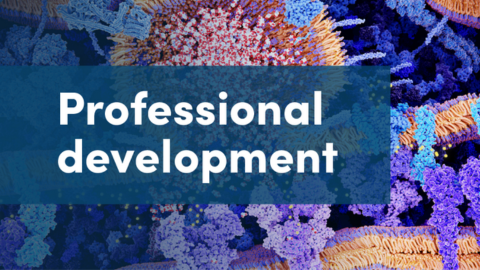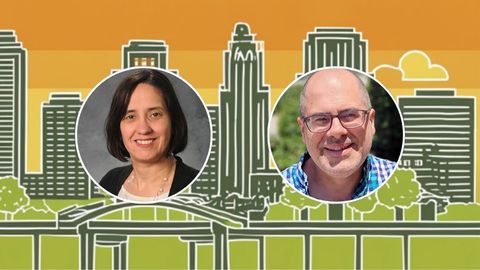Defining success for yourself
One of my favorite scenes in the “Lord of the Rings” movies is when Frodo is telling Gandalf that he wishes he didn’t have to deal with all the trouble that has come his way. “So do all who live to see such times,” Gandalf tells him. “But that is not for them to decide. All we have to decide is what to do with the time that is given to us.”
Whenever I find myself griping about my circumstances, I hear Ian McKellan’s Gandalf saying those lines in my head. It’s a comfort and a good reminder to concern myself only with the real life that I have right now.
But where I — and I think many of us — depart from Frodo’s path in the “Lord of the Rings” is certainty of purpose. Frodo knows what he has to do; he knows what success looks like: Destroy the ring and, in doing so, save the world. No one except the purely evil would argue with him. His only question is how.
If any of us knew there was one clear task we could do that was guaranteed to save the entire world, allowing all creatures to live peacefully till the end of their days, we’d probably find a way to do the task. But I don’t see a clear task like that laid out in front of me. I’m more like the character Pippin — never quite sure what I’ve gotten myself into, bumbling around looking for second breakfast, and occasionally providing comic relief. But Pippin finds his path as the story progresses, and his contributions end up being essential.
So what to do with the time that is given to us? For those of us who are more like Pippin than Frodo, how do we know we’re doing the right thing? In other words, how do we define success for ourselves, especially if our paths are a bit atypical?
I would guess most people want to be successful, but success in your eyes may or may not look like success to the person sitting next to you. It just takes about 10 seconds on social media to see that there are people waiting to criticize and argue about anything and everything you do. So rather than letting your own success be defined by others, it’s worth thinking of what your own definition is.
Defining what you value
Often when we say someone was successful, we mean that the person had a job most people would think of as desirable, and the person was good at it. Maybe they got recognition, such as awards, or high pay. Maybe they achieved something first or did it best.
But maybe a broader definition of success is living a life that matches your values. Those values might be money or popularity — or success in the common sense. But it might not be. Maybe it’s using your skills, learning a lot or being a good friend. If success is living a life that matches your values, you have to know what your values are and what it would look like to live a life in line with them.
In their book “Designing Your Life,” Stanford design professors Bill Burnett and Dave Evans describe two things each person should be clear on. They call them a “lifeview” and a “workview.” They suggest each person sit down and write a paragraph about what their views on life and work are. Some of the suggested questions to get you going are below.
Lifeview
-
Why are we here?
-
What is the purpose or meaning of life?
-
What is the relationship between the individual and others?
-
Where do family, country and the world fit in?
-
What is good or evil?
-
Is there a higher power?
-
What is the role of joy, sorrow, justice, injustice, love, peace and strife?
Workview
-
What is work for?
-
Why work?
-
What does work mean?
-
How does it relate to the individual? Others? Society?
-
What defines good work?
-
What does money have to do with it?
-
What do experience, growth and fulfillment have to do with it?
At Vanderbilt University as a postdoc, I participated in a “Designing Your Life” workshop. We did the lifeview and workview exercise, and, going into it, I thought it was silly. The answers seemed obvious at times. But then we sat together and read our work and lifeview answers out loud, and I realized every single person’s answers were different. In fact, they reflected sometimes radically different views of what was important and different images of what it looks like to live a good life.
Finding answers when you’re unsure
You may not have answers to those questions already in your mind. Your sense of where your life should go doesn’t necessarily come automatically. For a lot of our lives, we’re told what to do, explicitly or implicitly given other people’s expectations, and given grades in school. For years, we walk around being told whether what we’re doing is right or wrong. It’s possible you looked at those questions and weren’t sure what you thought or couldn’t quite separate what you thought from what other people have told you.
Not letting others dictate your values for you doesn’t have to mean sitting and meditating alone though. Learning from others and measuring other people’s answers against your own internal sense of things can open your horizons,
Talking to friends and family about their views on work and life is a great place to start. People usually like to be asked thoughtful questions and to be listened to thoughtfully. Informational interviews withpeople in a range of careers is another way to get ideas about different kinds of lives. Even reading through careers articles here on ASBMB Today is a great way to start.
On a broader scale, seeking out a wide range of writings can help you find what resonates with you and can help you calibrate your compass. Stay open to inspiration from unusual places. For example, one of my favorite poets writes a monthly Substack, which I subscribe to, and in one post she quoted a philosopher who intrigued me, so I started reading their work, and was happily surprised at how much that writing helped me define some of my values.
Being sponge-like, soaking up views and ways of living, even from people with whom you disagree (or think you will) can be inspiring. Reading writing from folks with whom you don’t agree can be especially helpful, actually, because you will either truly disagree and end up understanding more about yourself and your values, as you think and express why you disagree, or you will end up not disagreeing as much as you thought you would, and you’ll have learned more about how you fit in the world or gained a new point of view.
My own opinion here is to get a library card and browse. Most libraries offer e-books and audiobooks so you can get your reading in on the subway or your walk to work and never have to pay late fees or even set foot inside the library.
Final thought
By the end of “The Lord of the Rings,” by learning an immense amount about the world while still staying true to himself, Pippin hasn’t just been heroic, but he has also helped everyone around him find comfort and joy in hard times. That seems pretty close to what a hobbit would define as success. If even bumbling Pippin can find success, we all can too.
Enjoy reading ASBMB Today?
Become a member to receive the print edition four times a year and the digital edition monthly.
Learn moreFeatured jobs
from the ASBMB career center
Get the latest from ASBMB Today
Enter your email address, and we’ll send you a weekly email with recent articles, interviews and more.
Latest in Careers
Careers highlights or most popular articles

Upcoming opportunities
Nominate a colleague for the distinction of ASBMB fellow to honor their exceptional service to ASBMB and distinguished record of professional accomplishment.

Upcoming opportunities
Friendly reminders to register for the upcoming ASBMB Breakthroughs webinar on nuclear second messenger signaling and ASBMB's in-person symposium on proteomics in Cambridge, Mass.

2025 PROLAB awardees announced
Seven early-career scientists receive grants to advance their research by working in North American labs.

Upcoming opportunities
Register for ASBMB's upcoming free professional development webinars on women in science and commercializing biomedical research.

Teach, learn & transform biochemistry education
Meet the co-chairs of the 2025 ASBMB meeting on reimagining undergraduate education in the molecular life sciences to be held July 24–27, 2025 in St. Paul, Minnesota.

Upcoming opportunities
Submit your abstract for ASBMB's upcoming meetings on nucleophilic proteases, gene expression and O-GlcNAc.

